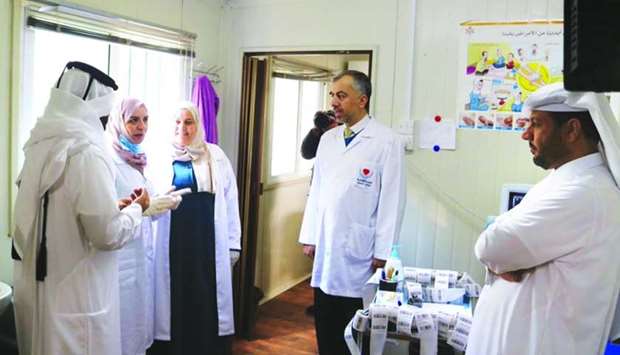A high-level delegation from Qatar Fund for Development (QFFD) visited the Zaatari camp in Jordan to oversee the situation in the camp and QFFD-funded health programmes.
Through the funding, QFFD aims to facilitate the inclusion of Syrian refugees and reduce pressure on services to host communities and increase the flexibility of health providers.
The delegation was accompanied by representatives from Qatar Charity (QC), Qatar Red Crescent Society (QRCS) and the United Nations High Commissioner for Refugees (UNHCR).
They were briefed on the latest developments regarding health centres, how they work in the camp and the co-ordination between Qatar Charity and QRCS with the UNHCR and the most important aspects of the work they are doing in Jordan for Syrian refugees.
With the increasing pressure on health systems due to the large influx of refugee populations, it has become a priority to support the capacity of healthcare services in host countries. The QFFD-funded programmes provide primary healthcare services and, where possible, secondary and tertiary care, which is a specialised referral from primary and secondary care, to both Syrian refugees and host communities. This aid comes in various forms, including direct support through the provision of equipment and supplies, capacity-building and the strengthening of the health system.
With support from QFFD, Qatar Charity is operating the Comprehensive Qatari Centre at village number 12 in Zaatari camp. This project aims to contribute to improving the living conditions of the Syrian refugees in Zaatari camp in Jordan. The centre seeks to increase the coverage of vaccination services for children and women of childbearing age within the camp and to provide reproductive health services including family planning, counselling, and care of pregnant women.
Also, Qatari clinics under the supervision of the QRCS have been providing primary healthcare services for over four years and are a major contributor to the healthcare system within the camp.
QFFD has supported the Office of UNHCR to provide primary healthcare and referral services to secondary and tertiary care, which benefited 34,816 people.
The delegation was accompanied by representatives from Qatar Charity (QC), Qatar Red Crescent Society (QRCS) and the United Nations High Commissioner for Refugees (UNHCR).
They were briefed on the latest developments regarding health centres, how they work in the camp and the co-ordination between Qatar Charity and QRCS with the UNHCR and the most important aspects of the work they are doing in Jordan for Syrian refugees.
With the increasing pressure on health systems due to the large influx of refugee populations, it has become a priority to support the capacity of healthcare services in host countries. The QFFD-funded programmes provide primary healthcare services and, where possible, secondary and tertiary care, which is a specialised referral from primary and secondary care, to both Syrian refugees and host communities. This aid comes in various forms, including direct support through the provision of equipment and supplies, capacity-building and the strengthening of the health system.
With support from QFFD, Qatar Charity is operating the Comprehensive Qatari Centre at village number 12 in Zaatari camp. This project aims to contribute to improving the living conditions of the Syrian refugees in Zaatari camp in Jordan. The centre seeks to increase the coverage of vaccination services for children and women of childbearing age within the camp and to provide reproductive health services including family planning, counselling, and care of pregnant women.
Also, Qatari clinics under the supervision of the QRCS have been providing primary healthcare services for over four years and are a major contributor to the healthcare system within the camp.
QFFD has supported the Office of UNHCR to provide primary healthcare and referral services to secondary and tertiary care, which benefited 34,816 people.

